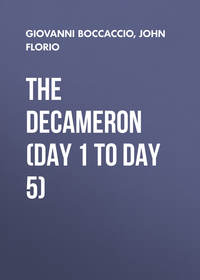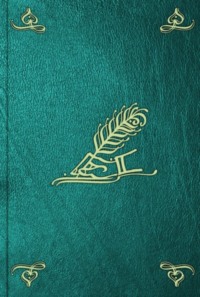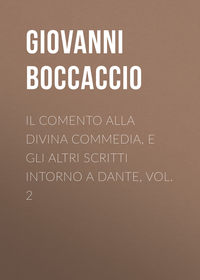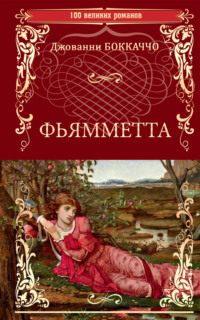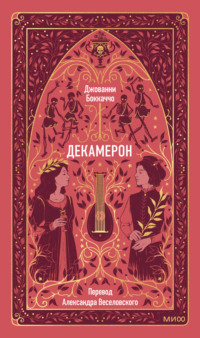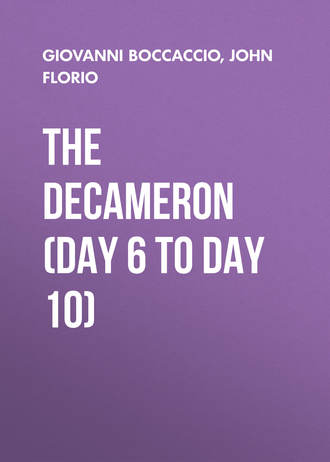 полная версия
полная версияThe Decameron (Day 6 to Day 10)
Reniero, upon my credit, if I gave thee an ill nights rest, thou hast well revenged that wrong on me; for, although wee are now in the moneth of July, I have beene plagued with extremity of colde (in regard of my nakednesse) even almost frozen to death: beside my continuall teares and lamenting, that folly perswaded me to beleeve thy protestations, wherein I account it well-neere miraculous, that mine eyes should be capable of any sight. And therefore I pray thee, not in respect of any love which thou canst pretend to beare me; but for regard of thine owne selfe, being a Gentleman and a Scholler, that this punishment which thou hast already inflicted upon me, may suffise for my former injuries towards thee, and to hold thy selfe revenged fully, as also permit my garments to be brought me, that I may descend from hence, without taking that from me, which afterward (although thou wouldst) thou canst never restore me, I meane mine honour. And consider with thy selfe, that albeit thou didst not injoy my company that unhappy night, yet thou hast power to command me at any time whensoever, with making many diversities of amends, for one nights offence only committed. Content thy selfe then good Reniero, and as thou art an honest Gentleman, say thou art sufficiently revenged on me, in making me dearely confesse mine owne error. Never exercise thy malice upon a poore weake woman, for the Eagle disdaineth to pray on the yeelding Dove: and therefore in meere pitty, and for manhoods sake, be my release from open shame and reproch.
The Scholler, whose envious spleene was swolne very great, in remembring such a malicious cruelty exercised on him, beholding her to weepe and make such lamentations; found a fierce conflict in his thoughts, betweene content and pitty. It did not a little joy and content him, that the revenge which hee so earnestly desired to compasse, was now by him so effectually inflicted. And yet (in meere humanity) pitty provoked him to commisserate the Ladies distressed condition: but clemency being over-weake to withstand his rigour, thus he replied. Madame Helena, if my entreaties (which, to speake truly, I never knew how to steepe in tears, nor wrap up my words in sugar Candie, so cuningly as you women know how to do) could have prevailed, that miserable night, when I was well-neere frozen to death with cold, and meerly buried with snow in your Court, not having anie place of rescue or shelter; your complaints would now the more easily over-rule me. But if your honour in estimation, bee now more precious to you then heretofore, and it seemeth so offensive to stand there naked: convert your perswasions & prayers to him, in whose armes you were that night imbraced, both of your triumphing in my misery, when poor I, trotted about your Court, with the teeth quivering in my head, and beating mine armes about my body, finding no compassion in him, or you. Let him bring thee thy Garments, let him come helpe thee down with the Ladder, and let him have the care of thine honour, on whom thou hast bene so prodigall heretofore in bestowing it, and now hast unwomanly throwne thy selfe in perill, onely for the maintenance of thine immodest desires.
Why dost thou not call on him to come helpe thee? To whom doeth it more belong, then to him? For thou art his, and he thine, why then shold any other but he help thee in this distresse? Call him (foole as thou art) and try, if the love he beareth thee, and thy best understanding joyned with his, can deliver thee out of my sottish detaining thee. I have not forgot, that when you both made a pastime of my misery, thou didst demand of him, which seemed greatest in his opinion, either my sottish simplicity, or the love thou barest him. I am not now so liberall or courteous, to desire that of thee, which thou wouldst not grant, if I did request it: No, no, reserve those night favours for thy amorous friend, if thou dost escape hence alive to see him againe. As for my selfe, I leave thee freely to his use and service: because I have sufficiently payde for a womans falshood, & wise men take such warning, that they scorne to bee twice deceived, & by one woman. Proceed on stil in thy flattering perswasions, terming me to be a Gentleman and a Scholler, thereby to win such favor from me, that I should think thy villany toward me, to be already sufficiently punished. No, trecherous Helena, thy blandishments cannot now hoodwink the eies of my understanding, as when thou didst out-reach me with thy disloyall promises and protestations. And let me now tell thee plainely, that all the while I continued in the Universitie of Paris, I never attained unto so perfect an understanding of my selfe, as in that one miserable night thou diddest enstruct mee. But admit, that I were enclined unto a mercifull and compassionate minde, yet thou art none of them, on whome milde and gracious mercy should any way declare her effects. For, the end of pennance among savage beasts, such as thou art, and likewise of due vengeance, ought to be death: whereas among men, it should suffice according to thine owne saying. Wherefore, in regard that I am neither an Eagle, nor thou a Dove, but rather a most venomous Serpent: I purpose with my utmost hatred, and as an ancient enemy to all such as thou art, to make my revenge famous on thee.
I am not ignorant, that whatsoever I have already done unto thee, cannot properly be termed revenge, but rather chastisement; because revenge ought alwayes to exceede the offence, which (as yet) I am farre enough from. For, if I did intend to revenge my wrongs, and remembred thy monstrous cruelty to me: thy life, if I tooke it from thee, and an hundred more such as thy selfe, were farre insufficient, because in killing thee, I should kill but a vile inhumane beast, yea, one that deserved not the name of a Woman. And, to speake truely, Art thou any more, or better (setting aside thy borrowed haire, and painted beauty, which in few yeares will leave thee wrinkled and deformed) then the basest beggarly Chamber-stuffe that can bee? Yet thou soughtest the death of a Gentleman and Scholler as (in scorne) not long since, thou didst terme me: whose life may hereafter be more beneficiall unto the world, then millions of such as thou art, to live in the like multiplicity of ages. Therefore, if this anguish be sensible to thee, learne what it is to mocke men of apprehension, and (amongst them especially) such as are Schollers: to prevent thy falling hereafter into the like extremity, if it be thy good lucke to escape out of this.
It appeareth to me, that thou art verie desirous to come downe hither on the ground; the best counsell that I can give thee, is to leape downe headlong, that by breaking thy necke (if thy fortune be so faire) thy life and lothsome qualities ending together, I may sit and smile at thy deserved destruction. I have no other comfort to give thee, but only to boast my happinesse, in teaching thee the way to ascend that Tower, and in thy descending downe (even by what means thy wit can best devise) make a mockery of me, and say thou hast learned more, then all my Schollership could instruct thee.
All the while as Reniero uttered these speeches, the miserable Lady sighed and wept very grievously, the time running on, and the Sunne amending higher and higher; but when she heard him silent, thus she answered. Unkinde and cruell man, if that wretched night was so greevous to thee, and mine offence appeared so great, as neither my youth, beautie, teares, and humble intercessions, are able to derive any mercy from thee; yet let the last consideration moove thee to some remorse: namely, that I reposed new confidence in thee (when I had little or no reason at all to trust thee) and discovered the integritie of my soule unto thee, whereby thou didst compasse the meanes, to punish me thus deservedly for my sinne. For, if I had not reposed confidence in thee, thou couldst not (in this manner) have wrought revenge on me, which although thou didst earnestly covet, yet my rash credulitie was thy onely helpe. Asswage then thine anger, and graciously pardon me, wherein if thou wilt be so mercifull to me, and free me from this fatall Tower: I do heere faithfully promise thee, to forsake my most false and disloyall friend, electing thee as my Lord and constant Love for ever.
Moreover, although thou condemnest my beauty greatly, esteeming it as a trifle, momentary, and of slender continuance; yet, such as it is (being comparable with any other womans whatsoever) I am not so ignorant, that were there no other reason to induce liking thereof: yet men in the vigour of their youth (as I am sure you think yourselfe not aged) do hold it for an especiall delight, ordained by nature for them to admire and honour. And notwithstanding all thy cruelty extended to mee, yet I cannot be perswaded, that thou art so flinty or Iron-hearted, as to desire my miserable death, by casting my selfe headlong downe (like a desperate madde woman) before thy face so to destroy that beauty, which (if thy Letters lyed not) was once so highly pleasing in thine eyes. Take pitty then on mee for charities sake, because the Sunne beginneth to heate extreamely: and as over-much colde (that unhappy night) was mine offence, so let not over-violent warmth be now my utter ruine and death.
The Scholler, who (onely to delight himselfe) maintained this long discoursing with her, returned her this answere. Madame, you did not repose such confidence in me, for any good will or affection in you towards me, but in hope of recovering him whom you had lost; wherein you merit not a jot of favour, but rather the more sharpe and severe infliction. And whereas you inferre, that your over-rash credulity, gave the onely meanes to my revenge: Alas! therein you deceive your selfe; for I have a thousand crochets working continually in my brain, whereby to entrap a wiser creature then a woman, yet veiled all under the cunning cloake of love, but sauced with the bitter Wormewood of hate. So that, had not this hapned as now it doth, of necessity you must have falne into another: but, as it hath pleased my happy stars to favour mee therein, none could proove more to your eternall scandall and disgrace, then this of your owne devising, which I made choise of, not in regard of any ease to you, but onely to content my selfe.
But if all other devises els had failed, my pen was and is my prevayling Champion, where-with I would have written such and so many strange matters, concerning you in your very dearest reputation; that you should have curst the houre of your conception, & wisht your birth had bin abortive. The powers of the pen are too many & mighty, whereof such weake wits as have made no experience, are the lesse able to use any relation. I sweare to you Lady, by my best hopes, that this revenge which (perhappes) you esteeme great and dishonourable, is no way compareable to the wounding Lines of a Penne, which can charracter downe so infinite infamies (yet none but guilty and true taxations) as will make your owne hands immediate instruments, to teare the eyes from forth your head, and so bequeath your after dayes unto perpetuall darkenesse.
Now, concerning your lost lover, for whose sake you suffer this unexpected pennance; although your choise hath proved but bad, yet still continue your affection to him: in regard that I have another Ladie and Mistresse, of higher and greater desert then you, and to whome I will continue for ever constant. And whereas you thinke, the warme beames of the Sunne, will be too hot and scorching for your nice bodie to endure: remember the extreame cold which you caused mee to feele, and if you can intermixe some part of that cold with the present heat, I dare assure you, the Sun (in his highest heate) will be far more temperate for your feeling.
The disconsolate Lady perceiving, that the Schollers wordes favoured of no mercy, but rather as coveting her desperate ending; with the teares streaming downe her cheekes, thus she replied. Wel Sir, seeing there is no matter of worth in me, whereby to derive any compassion from you: yet for that Ladies sake, whom you have elected worthy to enjoy your love, and so farre excelleth mee in Wisedome; vouchsafe to pardon mee, and suffer my garments to be brought me, wherewith to cover my nakednesse, and so to descend downe from this Tower, if it may stand with your gentle Nature to admit it.
Now beganne Reniero to laughe very heartily, and perceiving how swiftly the day ran on in his course, he saide unto her. Beleeve me Madame Helena, you have so conjured me by mine endeered Ladie and Mistresse, that I am no longer able to deny you; wherefore, tell me where your garments are, and I will bring them to you, that you may come downe from the Turret. She beleeving his promise, tolde him where she had hid them, and Reniero departing from the Tower, commanded his servant, not to stirre thence: but to abide still so neere it, as none might get entrance there till his returning. Which charge was no sooner given to his man, but hee went to the house of a neere neighbouring friend, where he dined well, and afterward laid him downe to sleepe.
In the meane while, Madame Helena remaining still on the Tower, began to comfort her selfe with a little vaine hope, yet sighing and weeping incessantly, seating her selfe so well as shee could, where any small shelter might yeelde the least shade, in expectation of the Schollers returning: one while weeping, then againe hoping, but most of all despairing, by his so long tarrying away with her Garments; so that beeing over-wearied with anguish and long watching, she fell into a little slumbering. But the Sunne was so extreamly hot, the houre of noone being already past, that it meerly parched her delicate body, and burnt her bare head so violently: as not onely it seared all the flesh it touched; but also cleft & chinkt it strangely, beside blisters and other painfull scorchings in the flesh which hindred her sleeping, to help her self (by all possible means) waking. And the Turret being covered with Lead, gave the greater addition to her torment; for, as she removed from one place to another, it yeelded no mitigation to the burning heate, but parched and wrinkled the flesh extraordinarily, even as when a piece of parchment is throwne into the fire, and recovered out againe, can never be extended to his former forme.
Moreover, she was so grievously payned with the head-ake, as it seemed to split in a thousand pieces, whereat there needed no great marvaile, the Lead of the Turret being so exceedingly hot, that it affoorded not the least defence against it, or any repose to qualifie the torment: but drove her still from one place to another, in hope of ease, but none was there to be found.
Nor was there any winde at all stirring, whereby to asswage the Sunnes violent scalding, or keepe away huge swarmes of Waspes, Hornets, and terrible byting Flyes, which vexed her extreamely, feeding on those parts of her body, that were rifte and chinkt, like crannies in a mortered wall, and pained her like so many points of pricking Needles, labouring still with her hands to beate them away, but yet they fastned on one place or other, and afflicted her in grievous manner, causing her to curse her owne life, hir amorous friend, but (most of all) the Scholler, that promised to bring her Garments, and as yet returned not. Now began she to gaze upon every side about her, to espy some labouring Husbandmen in the fields, to whom she might call or cry out for helpe, not fearing to discover her desperate condition: but Fortune therein also was adverse to her, because the heats extreamity, had driven all the village out of the fields, causing them to feede their Cattle about theyr owne houses, or in remote and shadie Valleyes: so that shee could see no other creatures to comfort her, but Swannes swimming in the River of Arno, and wishing her selfe there a thousand times with them, for to coole the extreamity of her thirst, which so much the more encreased, onely by the sight thereof, and utterly disabled of having any.
She saw beside in many places about her, goodly Woods, fayre coole shades, and Country houses here and there dispersed; which added the greater violence to hir affliction, that her desires (in all these) could no way be accomplished. What shall I say more concerning this disastrous Lady? The parching beames of the Sunne above her, the scalding heat of the Lead beneath her, the Hornets and Flyes everie way stinging her, had made such an alteration of her beautifull bodie: that, as it checkt and controlled the precedent nights darkenesse, it was now so metamorphosed with rednesse, yea, and blood issuing forth in infinite places, as she seemed (almost) loathsome to looke on, continuing still in this agonie of torment, quite voyde of all hope, and rather expecting death, then any other comfort.
Reniero, when some three houres of the afternoone were overpast, awaked from sleeping: and remembring Madame Helena, he went to see in what estate she was; as also to send his servant unto dinner, because he had fasted all that day. She perceyving his arrivall, being altogether weake, faint, and wonderously over-wearied, she crept on her knees to a corner of the Turret, and calling to him, spake in this manner. Reniero, thy revenge exceedeth al manhoode and respect: For, if thou wast almost frozen in my Court, thou hast roasted me all day long on this Tower, yea, meerly broyled my poore naked bodie, beside starving mee thorough want of Food and drinke. Be now then so mercifull (for manhoods sake) as to come uppe hither, and inflict that on me, which mine owne hands are not strong enough to do, I meane the ending of my loathed and wearisome life, for I desire it beyond all comfort else, and I shall honour thee in the performance of it. If thou deny me this gracious favour; at least send me uppe a glasse of Water, onely to moisten my mouth, which my teares (being all meerly dried up) are not able to doe, so extreame is the violence of the Sunnes burning heate.
Well perceived the Scholler, by the weaknesse of her voyce, and scorching of her body by the Suns parching beames, that shee was brought now to great extremity: which sight, as also her humble intercession, began to touch him with some compassion, nevertheles, thus he replied. Wicked woman, my hands shal be no means of thy death, but make use of thine owne, if thou be so desirous to have it: and as much water shalt thou get of me to asswage thy thirst, as thou gavest me fire to comfort my freezing, when thou wast in the luxurious heat of thy immodest desires, and I wel-neere frozen to death with extremity of cold. Pray that the Evening may raine downe Rose-water on thee, because that in the River of Arno is not good enough for thee: for as little pitty doe I take on thee now, as thou didst extend compassion to me then.
Miserable Woman that I am, answered Helena; Why did the heavens bestow beautie on mee, which others have admired and honoured, and yet (by thee) is utterly despised? More cruell art thou then any savage Beast; thus to vexe and torment mee in such mercilesse manner. What greater extreamity couldst thou inflict on me, if I had bin the destruction of all thy Kindred, and lefte no one man living of thy race? I am verily perswaded, that more cruelty cannot be used against a Traitor, who was the subversion of a whole Cittie, then this tyranny of thine, roasting me thus in the beames of the Sun, and suffering my body to be devoured with Flies, without so small a mercie; as to give mee a little coole water, which murtherers are permitted to have, being condemned by Justice, and led to execution: yea Wine also, if they request it.
But, seeing thou art so constant in thy pernitious resolve, as neither thine owne good Nature, nor this lamentable sufferance in me, are able to alter thee: I will prepare my self for death patiently, to the end, that Heaven may be mercifull to my soul, and reward thee justly, according to thy cruelty. Which words being ended, she withdrew her selfe towards the middest of the Tarras, despairing of escaping (with life) from the heates violence; and not once onely, but infinite times beside (among her other grievous extreamities) she was ready to dye with drought, bemoaning incessantly her dolorous condition.
By this time the day was well neere spent, and night beganne to hasten on apace: when the Scholler (immagining that he afflicted her sufficiently) tooke her Garments, and wrapping them up in his mans Cloake, went thence to the Ladies house, where he found Ancilla the Waiting-woman sitting at the doore, sad and disconsolate for her Ladies long absence, to whom thus he spake. How now Ancilla? Where is thy Lady and Mistris? Alas Sir (quoth she) I know not. I thought this morning to have found her in her bed, as usually I was wont to do, and where I left her yesternight at our parting: but there she was not, nor in any place else of my knowledge, neyther can I imagine what is become of her, which is to me no meane discomfort.
But can you (Sir) say any thing of her? Ancilla, said he, I would thou hadst bin in her company, and at the same place where now she is, that some punishment for thy fault might have falne uppon thee, as already it hath done on her. But beleeve it assuredly, that thou shalt not freely escape from my fingers, till I have justly paide thee for thy paines, to teach thee to abuse any Gentleman, as thou didst me.
Having thus spoken, hee called to his servant, saying. Give her the Garments, and bid her go looke her Lady, if she will. The Servingman fulfilled his Masters command, and Ancilla having receyved her Ladies cloaths, knowing them perfectly, and remembring (withall) what had bin said: she waxed very doubtfull, least they had slaine her, hardly refraining from exclaiming on them, but that greefe and heavie weeping overcame her; so that uppon the Schollers departing, she ranne in all hast with the garments towardes the Tower.
Upon this fatall and unfortunate day to Madame Helena, it chanced, that a Clowne or Countrey Peazant belonging to her Farme or Dairy house, having two of his young Heyfers wandred astray, and he labouring in diligent search to finde them: within a while after the Schollers departure, came to seeke them in Woods about the Tower, and, notwithstanding all his crying and calling for his beasts, yet he heard the Ladies greevous moanes and lamentations. Wherefore, he cryed out so lowd as he could, saying: Who is it that mourneth so aloft on the Tower? Full well she knew the voyce of her peazant, and therefore called unto him, and sayd in this manner.
Go (quoth she) I pray thee for my Waiting-woman Ancilla, and bid her make some meanes to come up hither to me. The Clowne knowing his Lady, sayde. How now Madame? Who hath carried you up there so high? Your Woman Ancilla hath sought for you all this day, yet no one could ever have immagined you to bee there. So looking about him, he espyed the two sides of the Ladder, which the Scholler had pulled in sunder; as also the steppes, which he had scattered thereabout; placing them in due order againe as they should bee, and binding them fast with Withies and Willowes.
By this time Ancilla was come thither, who so soone as shee was entred into the Tower, could not refrain from teares & complaints, beating her hands each against other, and crying out. Madam, Madam, my deare Lady and Mistresse! Alas, Where are you? So soone as she heard the tongue of Ancilla, she replyed (so well as she could) saying: Ah my sweet Woman, I am heere aloft uppon the Tarras; weepe not, neyther make any noyse, but quickely bring me some of my Garments. When shee heard her answer in such comfortable manner, she mounted up the Ladder, which the peazant had made very firme and strong, holding it fast for her safer ascending; by which meanes she went upon the Tarras. Beholding her Ladie in so strange a condition, resembling no humane body, but rather the trunke of a Tree halfe burned, lying flat on her face, naked, scorched and strangely deformed: shee beganne to teare the lockes of her owne hayre, raving and raging in as pittifull manner, as if her Ladie had beene quite dead. Which storming tempest, Madame Helena soone pacified, entreating her to use silence, and helpe to put on her garments.
Having understood by her, that no one knew of her being there, but such as brought her cloathes, and the poore peazant, attending there still to do her any service: shee became the better comforted, entreating them by all meanes, that it might bee concealed from any further discovery, which was on eyther side, most faithfullie protested.


